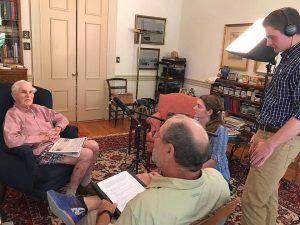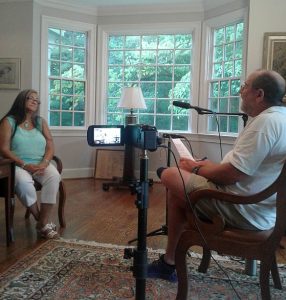“Life Along the Rappahannock” program is up and running
A unique partnership between Friends of the Rappahannock (FOR) and students and faculty from the University of Mary Washington (UMW) is capturing stories about people and their relationship to the river.
It’s an oral history program called “Life Along the Rappahannock,” and the first five interviews are now available for viewing on the FOR website. Each hour-long video features a narrator relating stories that involve the Rappahannock River. The intent is to capture compelling stories from the watershed before they are lost, according to FOR Community Conservationist Woodie Walker.
“For many years FOR has used history to connect people to this watershed,” said Walker. “Our Civil War paddling trip, and Hunter’s Island hike, are among our most popular interpretive trips. When the idea of an oral history program came up, we saw it as a continuation of that effort. For the past couple of years, we’ve been learning how to administer a scholarly oral history program, and now we want to share it as much as possible.”

Josiah P. Rowe III of Fredericksburg, left, is interviewed for the Life Along the Rappahannock oral history program, a collaborative effort between Friends of the Rappahannock (FOR) and the University of Mary Washington (UMW). Interviewers included Woodie Walker from FOR, center, and UMW students Nancy Milroy and Matt Griffiths.
FOR coordinated with faculty from UMW’s Department of History and American Studies in early 2016 and engaged a student intern. With funding from The Virginia Heritage Fund, administered by the Community Foundation of the Rappahannock River Region, the program conducted its first interviews and began the archiving process.
A grant from the Foundation’s Duff McDuff Green Jr. Fund allowed the program to expand in 2017, supporting another student intern, additional interviews, video editing and website development. A steering committee of local history professionals provided guidance and input, with steady oversight from UMW’s history faculty.
“Our focus is on permanent solutions for the future, so we are excited to support Life Along the Rappahannock. Mr. Duff Green, who lived most of his life on the river, entrusted the foundation to administer charitable funds left in his will. I feel sure he would applaud this work to save important local stories for generations to come,” said Lisa Biever, Director of Donor Services at The Community Foundation.
“Our goal is to provide future researchers with information about the Rappahannock River and issues that have affected it,” said Walker. “Our first three interviews were related to the Embrey Dam removal in 2004 and the establishment of the City of Fredericksburg’s Watershed Property.

Chief Anne Richardson of the Rappahannock Tribe, left, is interviewed for the Life Along the Rappahannock oral history program, a collaborative effort between Friends of the Rappahannock (FOR) and the University of Mary Washington (UMW). The interview was conducted by Woodie Walker from FOR, right.
“We next interviewed the longtime publisher of The Free Lance-Star, Josiah P. Rowe III, who also served as mayor of Fredericksburg in the 1960s, when issues like the Salem Church Dam were under consideration. Our most recent narrator is Chief Anne Richardson of the Rappahannock Tribe, and she gave a wonderful interview from the perspective of Native Americans in the watershed.”
Work in 2018 will focus on archiving interview transcripts and conducting new interviews. UMW interns will continue to help direct the program, said Walker, as well as record and edit new interviews.
“This program is an exciting chance for UMW students and faculty to work with community members preserving the history of Fredericksburg and the Rappahannock River,” said Dr. Jason Sellers, UMW Assistant Professor of History and American Studies.
“Stories connect us to one another. FOR values the stories about how people have experienced the Rappahannock River and how their actions have impacted this watershed,” said FOR Executive Director Kathleen Harrigan. “And we’re very proud of our partnership with UMW. The professors help us develop a quality program and the students have the chance to do real work they can put on their resumes. In the end, it’s all about connecting people to the river.”
To watch “Life Along the Rappahannock” videos, log onto www.riverfriends.org/oral-history/
Leave a Reply